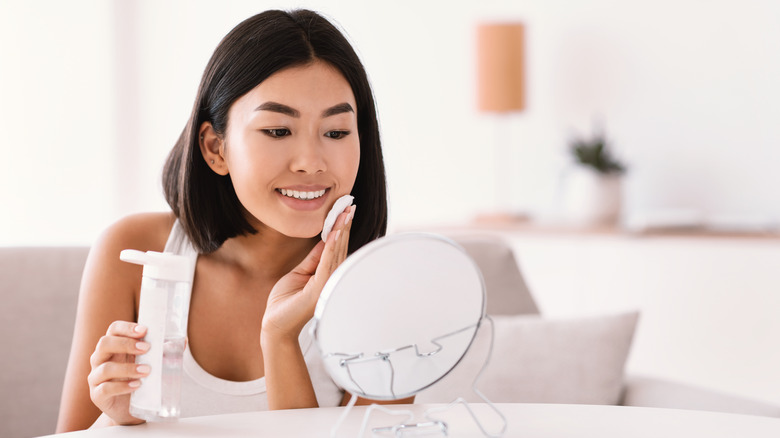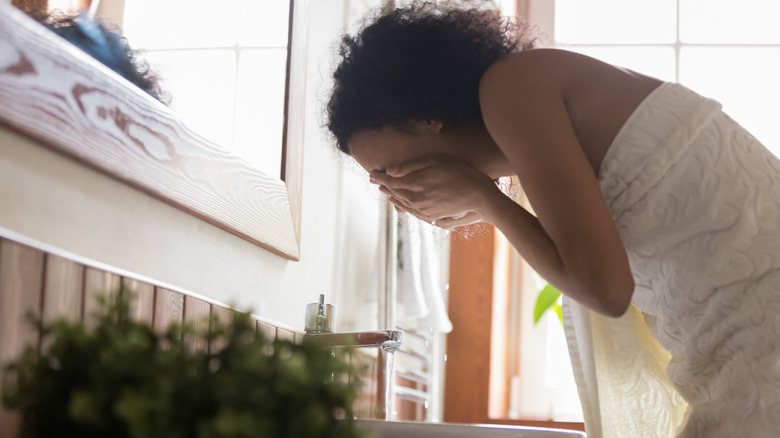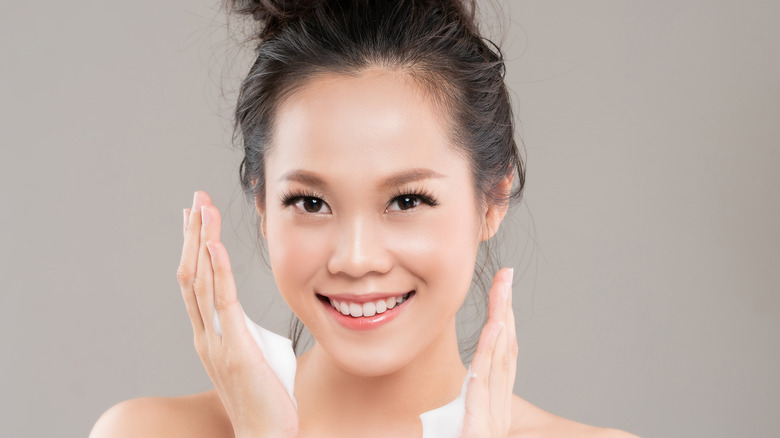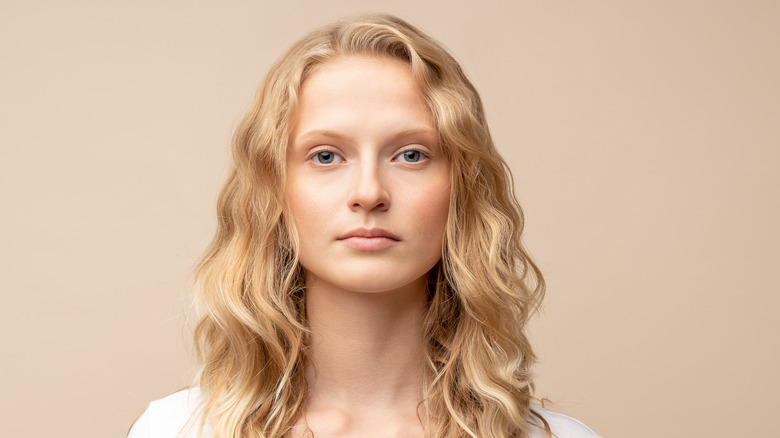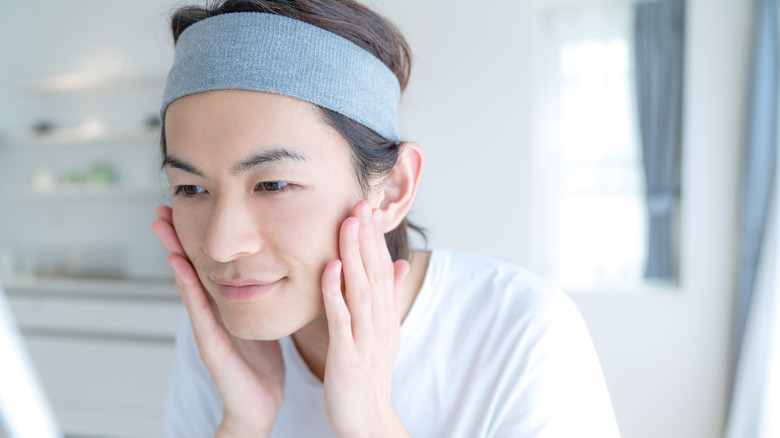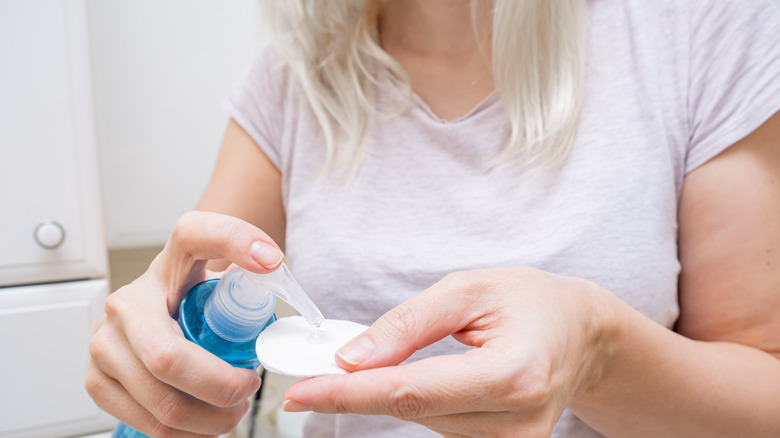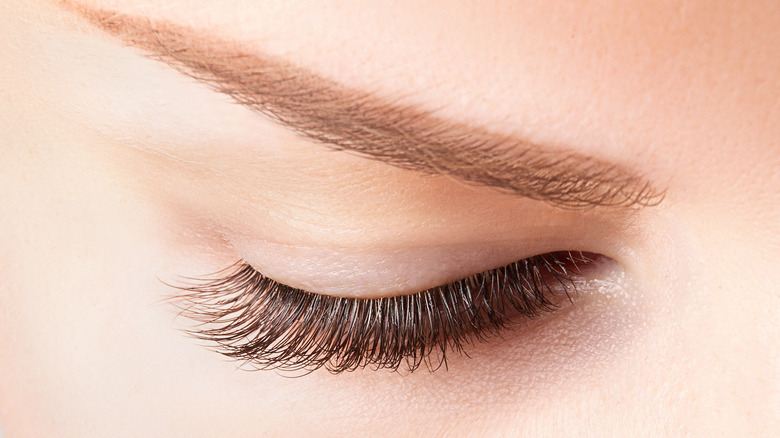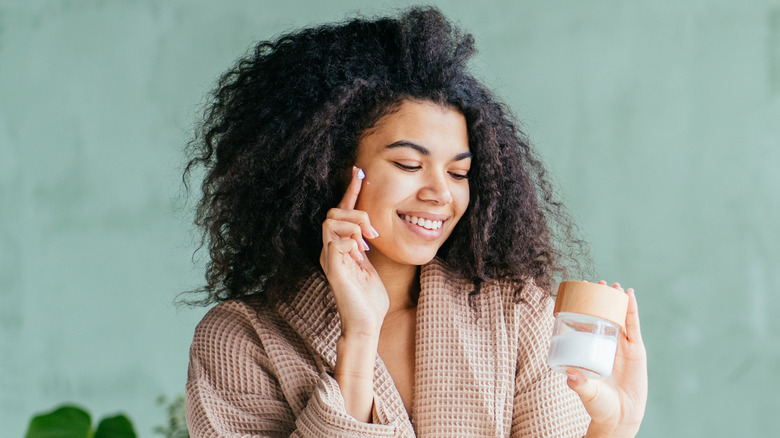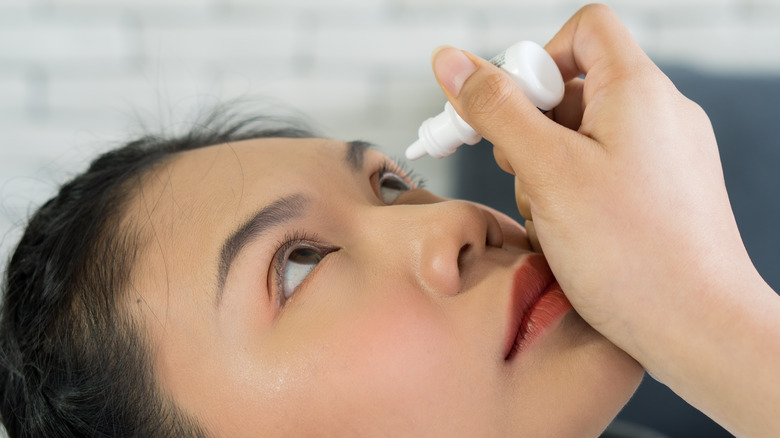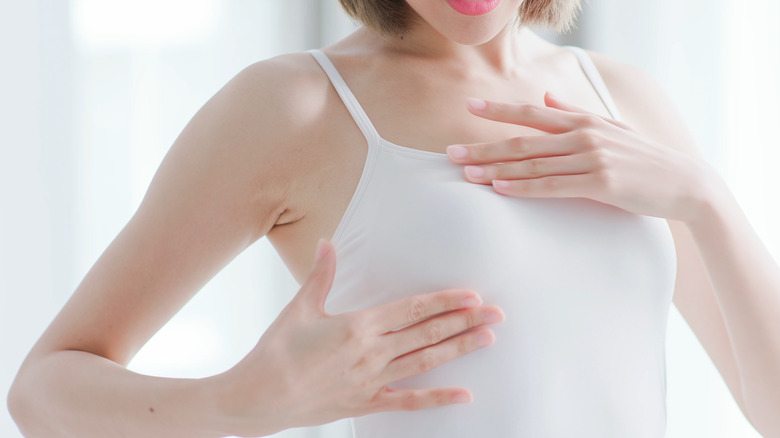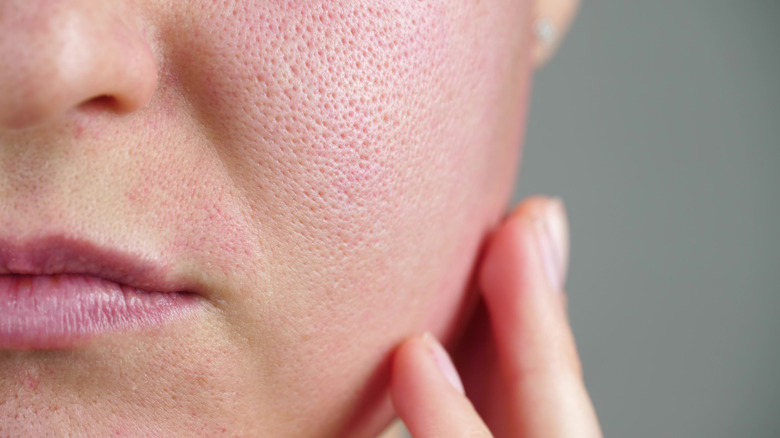When You Stop Wearing Makeup, This Is What Happens To You
Makeup is fun. You can change your whole appearance, spruce yourself up for different occasions, and get creative for fun events like parades and holiday parties. It can boost your confidence and help you to express yourself and your mood. Applying makeup is an art, after all. There is absolutely nothing wrong with wearing makeup — as much or as little of it as you want. It's your life, your prerogative!
However, there is something to be said about not caking chemicals on your face all the time. It's no secret that wearing makeup can make you feel great — but it's not necessarily great for your skin. While some makeup is better than others, generally speaking, wearing makeup can indeed take a toll on your face over time.
If you are considering going makeup-free and au natural instead, well, you may be onto something. Here are some reasons you might want to ditch all your concealers ... and bronzers and eye shadows and mascaras, at least for a little while. Or, you know, forever. Again, it's your prerogative.
Your pores can do their thing
When you wear makeup all the time, your pores are covered. After all, the whole purpose of slathering on foundation and concealer is to cover up your pores and even out your skin tone. The more you cake it on, the less you can see the skin underneath it — for better or worse. Going sans makeup, however, would mean your pores are no longer occluded, or blocked. "Occluding the skin can cause pimples, whiteheads, or blackheads. It can also cause skin to look dull — especially if a heavy amount of makeup is applied and not removed," dermatologist Papri Sarkar told Allure.
Celebrity facialist Teresa Tarmey agrees. She told Refinery29, "The makeup and dirt clogs pores, potentially leading to a breakout, especially if there's any kind of silicone or oil in your makeup." This is particularly true if you don't take your makeup off before going to sleep. "The skin works its magic at night, and it will really absorb any products left on the skin," Tarmey continued.
In other words: Wash your face! And consider ditching your makeup every once in a while to give your skin a break. You may be surprised at how good it feels and how much your skin clears up when you stop wearing makeup.
Your skin will have an easier time regenerating collagen and elastin
We know, we know: Wearing makeup is a Catch-22. Many of us often wear it to make ourselves look younger and to give our skin a glow. But the reality is that wearing makeup all the time can actually dim your skin's natural glow. When your face is covered in makeup — especially overnight — your skin has a harder time regenerating collagen and elastin (via Refinery29). And according to Healthline, "Skin with healthy levels of both collagen and elastin isn't just more youthful; it's stronger."
Aesthetic doctor David Jack told Refinery29 that cleaning and exfoliating your skin are even more important than moisturizing to get that dewy skin you have always wanted. You need to slough off dead skin cells so your skin can naturally regenerate healthy new cells. But wearing makeup all the time gets in the way of that process and congests your skin, he explained.
Your acne or skin irritation may clear up
You might be putting makeup on to cover up acne but the irony is that your makeup could be what is causing your breakouts. While it may feel embarrassing to go out in public with a giant zit on your forehead (though it shouldn't be, because it happens to the best of us!), resisting the urge to cover it up with a heavy-duty foundation could be the best thing you can do. "Overuse of makeup, especially foundations, can lead to skin irritation or acne breakouts," dermatologist Joshua Zeichner told NBC News. "Taking a break from makeup can help the skin repair itself."
Make sure to keep up your cleansing routine, though. "If you don't cleanse your face, dirt and dead skin cells are not removed," celebrity dermatologist Annie Chiu told Good Housekeeping. "They stay on the skin, clogging pores and leading to chronic inflammation in the form of pimples."
Scrub off that makeup, and maybe even leave it off for some time! Give it a go and see how your skin clears up over time. If your skin does not seem to get better, talk to your dermatologist as you may have an underlying skin condition unrelated to makeup irritants that needs treatment.
Your skin will look and feel younger
Playing around with colors and contours can be fun and give your face a fresh look. Nevertheless, your skin will likely look and feel a lot younger if you got rid of the makeup altogether — not just apply more and more in an attempt to conceal wrinkles and red spots. Sure, it may take some getting used to but, over time, you may notice that your skin really does improve on its own.
"Dirt and makeup trapped against your skin cause environmentally-induced oxidative damage," celebrity dermatologist Annie Chiu told Good Housekeeping. "This leads to a breakdown of the skin barrier and prematurely ages your face."
Others agree. "Makeup, especially powder makeup, can rest in fine lines and wrinkles and can actually make them appear more pronounced, especially around the eyes," Nadia Kihiczak, a dermatologist at Spring Street Dermatology in New York City, told Women's Health. Contrary to popular belief, you may want to empty your makeup cabinet and go totally natural if your goal is younger-looking skin.
You may experience fewer infections
Celebrity dermatologist Annie Chiu told Good Housekeeping, "Don't forget our skin is our first line of defense against infections." Infections can happen to anyone, of course, but you may find yourself more prone to infections if you wear makeup for long periods of time.
Part of the problem comes down to bacteria. "Many people don't realize that the makeup they use every day can become a haven for germs," ophthalmologist Chris Albanis told Health eNews. "When you unknowingly apply makeup that may be contaminated with bacteria, you run the risk of spreading that bacteria on your skin, eyes, and eyelids, leading to potential illness or infections."
Additionally, if you have an open cut on your face from picking at a pimple that has become inflamed and maybe is even oozing, covering it up with makeup can interfere with the healing process. Your skin needs to be unimpeded to do its thing to regenerate, and it can't do that if your makeup is constantly getting in the way. The same goes for any types of skin abrasions or irritations.
Ditching the makeup can ease inflammation
If you have any kind of skin inflammation, going without makeup may be the right move for you. Makeup can be irritating. And you may not even realize that it is the culprit behind your skin inflammation until you go a little while without it.
"Makeup often contains irritants like dyes and perfumes that, when left on the skin for long periods of time, can cause inflammation," celebrity dermatologist Annie Chiu told Good Housekeeping. Also, this is yet another reason why you should never sleep in makeup. She added that if you have rosacea or sensitive skin, you may be especially susceptible to these kinds of flare-ups from makeup's dyes and perfumes. Be careful about what you're putting on your face.
Of course, some skin care products are out there to help treat inflammation. But it's important to talk to your dermatologist about what is the best choice for you to avoid adverse effects. And, in the meantime, consider giving your skin a break from makeup.
Your pores will look less noticeable
"Makeup prevents pores from being cleaned out, leaving them larger and more noticeable," Rachel Nazarian, New York-based dermatologist at the Schweiger Dermatology Group, confirmed in an interview with Shape. If applying pore filler and layers of foundation and concealer have become part of your routine, you may want to consider taking a step back and ditch the makeup for a time.
Without a face full of makeup, your pores will likely appear smaller and less visible over time. After all, when they are clean and clear, they are not as obvious to the eye. Instead, your skin appears smoother and more even. "Often, a barrier of makeup increases oil production, so not wearing makeup can decrease oiliness, clogged pores and pimples," Hadley King, a dermatologist in New York City, told Women's Health. Consider skipping the" barrier of makeup" every now and again, or, you know, altogether!
Your lashes may become longer and stronger
Lucious, long lashes are the name of the game. And your lashes may just be a lot stronger if you stop wearing — and sleep in — mascara all the time. "Lashes become brittle and dry when mascara is left on and slept in, so washing off your makeup will leave your lashes healthier and help maintain their length," Rachel Nazarian, New York-based dermatologist at the Schweiger Dermatology Group, told Shape.
There are other ways mascara can hurt your eyelashes, too. Removing mascara (especially waterproof mascara) day in and day out can "tug and pull on your lash line, causing them to weaken and break," Kate Stromberg, celebrity makeup artist at Color Salon in Caesar's Palace in Las Vegas, told Insider. Using old and even expired mascara and eye makeup can also hurt your lashes. Although there are less damaging ways to remove your eye makeup and gentler mascaras, ditching the product altogether may give your lashes a much-needed break, strengthen them, and leave them longer in the ... long run (pun intended).
Your dry skin could improve
Have dry skin? We hate to be the ones to break it to you, but it could very well be because of the makeup you are wearing. Sure, there are tons of reasons for dry skin — everything from the weather to the water could affect your skin (via Everyday Health). But makeup can exacerbate the problem. And if you don't wash your face and instead let that makeup sit for long periods of time and even overnight, it could prevent all the dry and dead skin from flaking off and new skin from forming.
"One of the most basic problems that occurs when you don't clean your face before bedtime is that natural skin sloughing, where dead skin is replaced with new cells, is impeded," Dr. Rachel Nazarian at Schweiger Dermatology Group, told Marie Claire. "Dead skin cells accumulate, leading to dull, dry skin." While washing off your makeup each night is a good first step, consider going without makeup and sticking with just moisturizer for a time, especially if you have dry skin. "If you have a condition where the skin barrier is disrupted, for example in severe dryness or eczema, not wearing makeup can allow the skin to heal itself," dermatologist Joshua Zeichner recommended to NBC News.
You'll be less prone to eye infections
Eye infections can happen to anyone, but if you wear a ton of eye makeup and let it sit for long periods of time or sleep without washing it off, you can make yourself more prone to eye infections. Old makeup that collects bacteria in your makeup bag can do the same. And who wants to deal with itchy, infected eyes? No one. While it is not common, some people have been temporarily or permanently blinded by eye makeup, according to the University of Rochester Medical Center. This is unlikely to happen to you, but you may notice uncomfortable symptoms like swollen eyelids, red eyes, itching, irritation, inflammation, and discharge.
It's not just old or long-worn makeup that poses a risk though. When applying shadow, liner, or mascara, you can easily poke yourself in the eye and suffer an injury, Dr. Houman Ahdieh explained in an article for Lehigh Valley Center for Sight. While you should definitely toss your expired makeup, you may just want to consider going without any cosmetics for a time.
Could you decrease your risk of breast cancer by ditching makeup?
In case you didn't know: Some of the chemicals in cosmetics have been linked to breast cancer. According to BreastCancer.org, a registered 501(c)(3) nonprofit organization, exposure to chemicals in cosmetics — at certain dangerous levels — "may contribute to the development of cancer in people."
"Because personal care products contain a diverse combination of chemicals, it's nearly impossible to show a definite cause and effect for any specific chemical on its own," according to the nonprofit. "Still, many of these chemicals are considered hormone disruptors." Hormone disruptors basically affect the estrogen production in your body and the way other hormones act. They do this by blocking them or mimicking them, and it can make your whole balance out of whack.
While your makeup may or may not contribute to the development of cancer in the future, steering clear of these chemicals altogether certainly cannot hurt you. At the very least, you should be sure you are reading up on the ingredients in your makeup.
You may have fewer allergic reactions
You may not even notice you are allergic to certain cosmetics if your skin just always tends to look inflamed and irritated; you may think that's just the way your skin is (via Verywell Health). According to the University of Rochester Medical Center, however, allergic reactions and general sensitivity to ingredients in cosmetic products is not uncommon. This can present in rashes, red skin, inflammation, and irritation. In mild cases, though, contact dermatitis can cause your skin to simply look "slightly reddened and dehydrated no matter how often you moisturize. Your skin may have a rough, uneven, or sandpapery look. Skin may feel hot to the touch or look flushed," Verywell Health explained.
Of course, by not wearing makeup, you can mitigate your risk of contact dermatitis and other skin maladies — it's simple science. If this sounds like your skin but you're not ready to give up makeup, try to at least look for cosmetics that have been FDA-tested. If a product has not been tested, it must display a label that reads, "WARNING — The safety of this product has not been determined," according to the University of Rochester Medical Center.
You will likely be exposed to far fewer chemicals if you give up makeup
Cosmetics often contain chemicals. And you never really know everything that goes into a product, especially if it has not been FDA-tested. Ditching makeup, therefore, means ditching at least some of the chemicals you come into contact with on a daily basis.
According to one study published in Environmental Health Perspectives, "Makeup, shampoo, skin lotion, nail polish, and other personal care products contain chemical ingredients that lack safety data." What is scarier: Some of these chemicals have been linked to genital birth defects, infertility, and more health problems in animal studies. While there is no definitive evidence when it comes to humans, some researchers believe that "widespread exposure, primarily to phthalates, has been shown to occur."
Thankfully, phthalate-free cosmetics are available for purchase (via Byrdie). Still, you may find going without any makeup to be an even safer bet.

